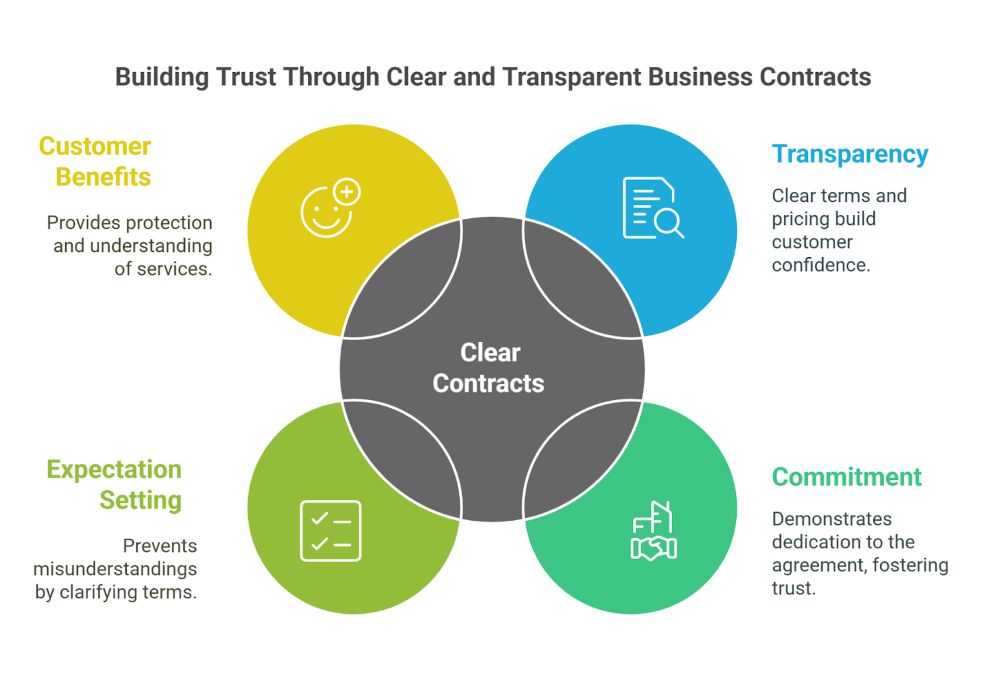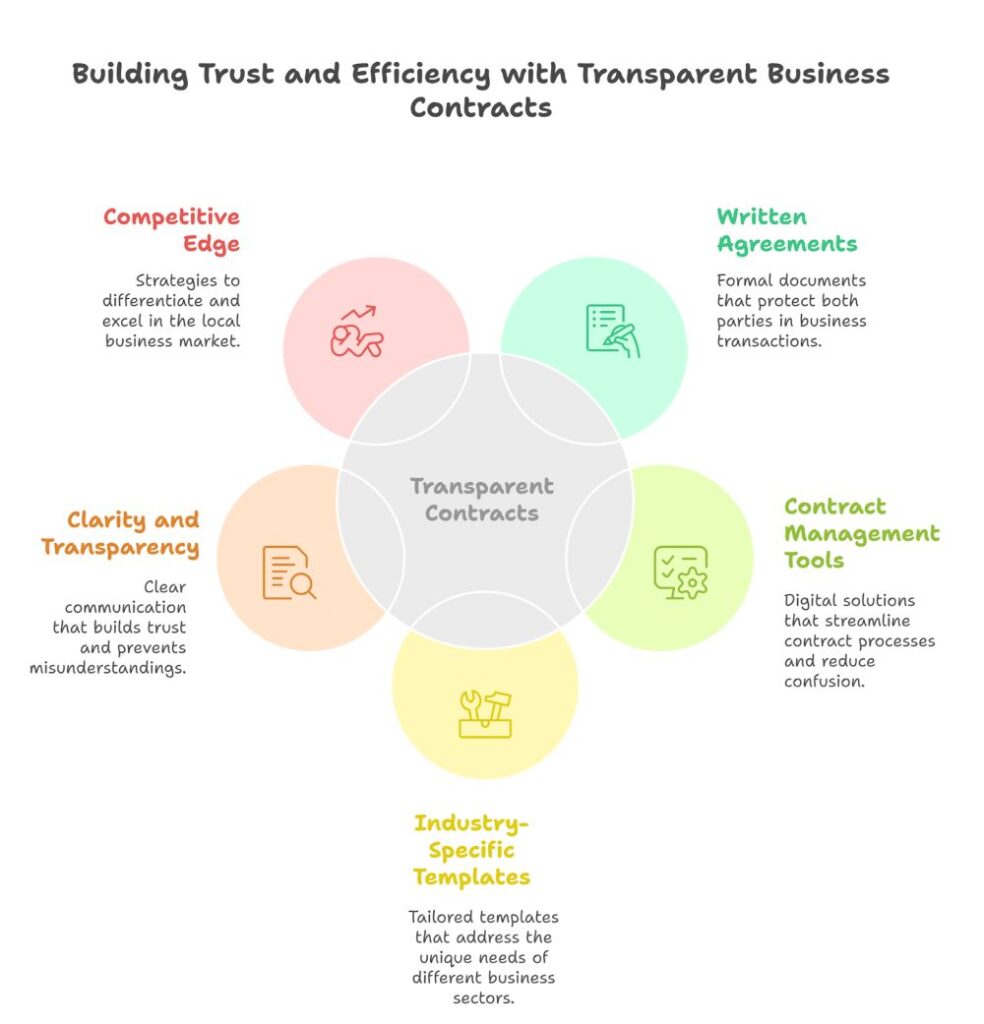Building Customer Trust Through Transparent Contracts: A Local Business Advantage
Local businesses have a unique advantage when prioritizing transparency in their customer contracts.
Unlike large corporations that often hide behind complex legal jargon, small businesses can build deeper community connections through clear, straightforward agreements.
Transparency in business is the process of being open, honest, and straightforward about various company operations. This creates a foundation of trust that significantly impacts customer loyalty and retention.
When customers understand exactly what they’re agreeing to, they feel respected and valued.
This transparency doesn’t just prevent misunderstandings—it actively builds customer trust.
Local businesses that implement clear contracts demonstrate their commitment to ethical practices while protecting themselves legally. The clearer the terms, the less likely disputes will arise later.
The exchange of information between businesses and customers must be balanced. While contracts protect the business, they should also acknowledge and protect customer interests.
This mutual respect creates lasting relationships that help local businesses thrive against larger competitors who may prioritize fine print over customer loyalty.
Key Takeaways
- Clear, jargon-free contracts demonstrate respect for customers and create a competitive advantage for local businesses.
- Transparent agreements reduce disputes while simultaneously protecting both the business and its customers.
- Businesses that prioritize openness in their contractual relationships foster stronger community connections and increased customer loyalty.
Why Contracts Are Essential For Local Business Trust

Contracts form the backbone of trustworthy business relationships in local communities.
They provide a solid foundation for interactions between businesses and customers while protecting both parties from potential misunderstandings.
Customers Value Clarity And Fairness
Clear contracts show customers that a local business values transparency. When customers see all terms, pricing, and deliverables spelled out in writing, they feel more confident making purchases.
Building trust becomes easier when there are no surprises.
Contracts demonstrate a business’s commitment to the agreement. This commitment helps establish trustworthiness and strengthens customer relationships over time.
Local businesses benefit from repeat customers who appreciate fair dealings. A well-crafted contract sets proper expectations from the beginning.
This clarity prevents disappointment when verbal agreements are misremembered or misinterpreted.
Benefits of clear contracts for customers:
- Protection from unexpected charges
- Understanding of exactly what services they’ll receive
- Knowledge of timelines and deadlines
- Clear procedures for addressing concerns
Small Businesses Can’t Afford Legal Gray Areas
Contract disputes can be devastating financially and reputationally for local businesses. Legal agreements help prevent conflicts that might otherwise drain a small business’s limited resources.
Well-drafted contracts define important boundaries in business relationships. They specify what happens if deliverables are delayed, payments are missed, or quality standards aren’t met.
Small business owners often work within tight profit margins. They cannot easily absorb the costs of misunderstandings that larger companies might handle. Contracts are protected by:
- Creating a legal record of the agreement
- Reducing the risk of non-payment
- Clarifying scope to prevent scope creep
- Establishing cancellation policies
With contract intelligence, even small companies can maintain visibility of all their obligations. This ensures they fulfill promises made to customers, further building trust in the local community.
Ready to set clear expectations from day one? Surge Business Law offers contract drafting services designed for Iowa and Austin businesses—simple, fair, and flat-fee from the start. Reach out now.
What Makes A Contract “Transparent” In The Eyes Of Customers
Transparent contracts build trust by making agreements understandable and fair. Customers value clarity, simplicity, and balance in contractual relationships with local businesses.
Simple Language Over Legal Jargon
Transparent contracts use plain, everyday language instead of complex legal terminology.
When businesses replace phrases like “hereinafter referred to as” with simple terms, customers feel more comfortable signing agreements.
By using clear, concise messaging, small businesses can build trust through transparent communication. This means:
- Avoiding unnecessary legal jargon
- Using short sentences and familiar words
- Defining technical terms when they must be used
- Breaking down complex concepts into simple explanations
Studies show that contracts written at an 8th-grade reading level receive higher customer satisfaction ratings.
Local businesses gain a competitive edge when they create agreements that don’t require a law degree to understand.
Fair Terms That Protect Both Parties
Transparent contracts balance the needs of both the business and customer. They don’t hide fees, penalties, or obligations in dense paragraphs of text.
Key elements of fair contracts include:
| Fair Contract Feature | Customer Benefit |
| Clear cancellation terms | Prevents feeling trapped |
| Reasonable late fees | Avoids unexpected penalties |
| Mutual exit options | Creates a feeling of partnership |
| Balanced liability clauses | Builds confidence in fairness |
Local businesses that craft honest relationships with customers see higher retention rates. A transparent approach demonstrates respect for customers’ rights and intelligence.
Examples Of Transparent Clauses
Effective transparent clauses directly address common customer concerns. They present information in digestible formats that highlight important points rather than hiding them.
Payment Terms Example: “You’ll be charged $99 monthly on the 1st. If you cancel before the 25th of any month, no further charges will apply.”
Warranty Example: “This product is guaranteed for 2 years. If it breaks during normal use, we’ll repair or replace it at our cost within 14 days.”
Local businesses that adopt financial transparency in their contracts often highlight important terms in bold or create simple charts explaining payment schedules. This approach demonstrates the company has nothing to hide.
Smart businesses also include real-world examples showing how contract terms apply in common scenarios. This practice helps customers understand exactly what they’re agreeing to before signing.
How Transparent Contracts Improve Customer Loyalty
Clear contract terms strengthen customer relationships and foster long-term loyalty. When businesses openly share their policies and agreements, customers feel respected and valued.
Trust Is A Long-Term Asset
Trust takes time to build but can be lost in an instant. Transparent business practices help companies establish a foundation of trust that keeps customers coming back.
When contracts clearly explain terms, pricing, and obligations without hidden clauses, customers feel secure in their relationship with the business.
Studies show that 94% of consumers are more likely to be loyal to brands that offer complete transparency. This isn’t surprising, as no one likes feeling tricked by fine print or unexpected charges.
Local businesses that use plain language in their contracts demonstrate respect for their customers’ time and intelligence. This approach differentiates them from competitors who rely on complex legal jargon to obscure unfavorable terms.
Local Businesses Depend On Word Of Mouth
Small businesses thrive on customer recommendations. When contracts are straightforward and fair, customers become powerful advocates. Building a reputation for honesty directly impacts a local business’s success.
Transparent contracts create positive experiences worth sharing. Consider these benefits:
- Increased referrals: Satisfied customers recommend businesses they trust
- Better online reviews: Clear policies lead to fewer misunderstandings
- Stronger community presence: Reputation for fairness spreads quickly locally
Brand transparency in contracts shows customers that a business values long-term relationships over short-term gains.
When customers understand exactly what they’re signing, they’re more confident in making purchases and more forgiving when minor issues arise.
Smart local businesses recognize that each contract represents not just a single transaction, but potential lifetime value through repeat business and referrals.
Contract Tips For Community-Based Businesses

Local businesses can gain a competitive edge by using transparent contracts that build customer trust. These agreements serve as the foundation for successful business relationships in your community.
Use Written Agreements For Every Transaction
Written agreements protect your business and customers, even for small jobs.
Contract management tools can streamline this process and reduce confusion. Create a simple template that covers the basics for standard services.
A good small business contract should include:
- Names and contact information for all parties
- Detailed description of services or products
- Payment terms and methods
- Timeframes for delivery or completion
- Cancellation policies
- Signatures from all parties
Even for minor transactions, having something in writing prevents misunderstandings. Many disputes arise from verbal agreements where memories differ. Templates save time while ensuring consistency across all customer interactions.
Consider digital contract solutions that allow for quick customization and easy storage. These systems also enable faster client approvals.
Tailor Your Contracts By Service Type
Different services need different contract elements. For example, a lawn care business needs terms that are different from those of a web design company or retail store.
For service-based businesses:
- Include specific deliverables
- Define quality standards
- Outline revision processes
- Address intellectual property rights
For product-based businesses:
- Detailed product specifications
- Explain warranty information
- Include return policies
- Address shipping or delivery details
Local business advantages come from understanding community needs and reflecting them in contracts. Study competitors’ terms to identify industry standards and opportunities to differentiate.
Consider creating industry-specific templates for efficiency. This approach maintains personalization while saving valuable time.
Be Clear On Scope, Payment, And Timelines
Vague language leads to disagreements. Transparency builds trust by clearly defining expectations upfront.
Scope clarity checklist:
- Specific deliverables: Exactly what the client receives
- Exclusions: What is NOT included
- Change request process: How modifications are handled and billed
Payment terms must address:
- Total cost breakdown
- Deposit requirements
- Milestone payments (if applicable)
- Late payment consequences
- Accepted payment methods
Timeline specifications should include:
- Start date
- Key milestones
- Completion date
- Factors that might cause delays
- Client responsibilities that affect timing
Use plain language rather than legal jargon. Cutting unnecessary complexity helps clients understand their obligations without asking questions or seeking clarification.
The Legal And Financial Protection Contracts Provide
Well-crafted contracts provide essential protections that shield businesses from potential financial losses and legal complications.
These documents establish clear boundaries and expectations that can make all the difference when issues arise.
Limiting Liability
Contracts can explicitly define the extent of a business’s liability in various scenarios. This protection is crucial for local businesses that may not have the resources to withstand significant legal challenges.
A properly drafted contract can include:
- Liability caps that set maximum damage amounts
- Indemnification clauses that shift certain risks to the appropriate party
- Force majeure provisions that address uncontrollable circumstances
These elements protect businesses and create clarity for all parties. Contract lawyers for local businesses can customize these provisions to fit specific industry requirements and risk profiles.
Without these protections, even minor disagreements can escalate into costly disputes that threaten a company’s survival.
Enforceability In Case Of Dispute
When disagreements occur, contracts provide the framework for resolution. They serve as the backbone of business relationships, establishing the rules that courts will follow if litigation becomes necessary.
Key enforceability factors include:
- Clear terms and conditions that leave little room for interpretation
- Dispute resolution procedures that may include mediation or arbitration
- Jurisdiction clauses that determine where legal proceedings will take place
These provisions can save tremendous time and money if conflicts arise. They provide predictability in unpredictable situations and help businesses maintain operations while addressing disputes.
Courts generally uphold contracts when they’re properly executed, making them powerful tools for establishing trust and mutual understanding. This enforceability gives local businesses leverage they might otherwise lack when dealing with larger entities.
Stop relying on generic templates. Surge Business Law reviews and customizes service agreements that protect your business and build trust, without the fine-print surprises. Contact us today.
Avoiding Common Contract Mistakes In Small Business
Small businesses often struggle with contract issues that can lead to costly problems. Skipping written agreements and misunderstanding key terms are frequent errors that undermine customer trust and business protection.
DIY Contracts Without Legal Review
Creating your own contracts without professional review is risky for small businesses. Many entrepreneurs use templates found online without customizing them to their specific needs.
This approach may save money initially but often leads to expensive legal problems later.
Verbal agreements are difficult to enforce and frequently result in misunderstandings between parties.
A properly reviewed contract defines the relationship and protects the business and its customers.
Consider these alternatives to DIY contracts:
- Consult with a business attorney for a one-time contract review
- Use industry-specific templates that legal counsel then reviews
- Join professional associations that offer pre-vetted contract templates
Even a simple legal review can identify critical gaps that might otherwise leave a business vulnerable.
Overlooking Key Terms
Many service agreements fail because they omit essential terms that protect the business.
Terms covering payment schedules, scope of work, and termination conditions are frequently inadequate or missing entirely.
Small businesses should ensure their contracts clearly define:
| Essential Contract Component | Why It Matters |
| Scope of services | Prevents scope creep and clarifies deliverables |
| Payment terms | Establishes when and how payment occurs |
| Termination clauses | Defines how either party can end the relationship |
| Dispute resolution | Sets procedures for handling disagreements |
Understanding the nuances of these conditions helps businesses avoid misunderstandings with customers. Clear terms build trust by establishing transparent expectations from the beginning of the relationship.
Not Updating Contracts As You Grow
Static contracts fail to protect evolving businesses. As companies add services, enter new markets, or face changing regulations, their contracts must adapt accordingly.
Neglecting intellectual property rights becomes increasingly problematic as businesses grow.
Regular contract reviews ensure proper protection of newly developed products, services, and brand elements.
Consider these contract update triggers:
- Adding new products or services
- Expanding to new geographic markets
- Changes in industry regulations
- Shifts in business model or operations
Small businesses benefit from scheduling annual contract reviews. This practice demonstrates to customers that the business maintains transparency as a core value, actively ensuring their agreements remain fair and current.
Using outdated contracts signals carelessness to customers and creates legal vulnerabilities that can damage business relationships and reputation.
How Surge Business Law Supports Transparent Contracting
Surge Business Law specializes in helping businesses understand and control their legal risks through clear and simple business legal advice.
Their approach to contracts emphasizes transparency, which helps local businesses build stronger customer relationships.
Flat-Rate Contract Drafting And Review
Small business owners often worry about unpredictable legal costs. Surge Business Law addresses this concern by offering flat-fee contract drafting services that eliminate surprise billing.
This transparent pricing model allows businesses to budget accurately for legal expenses.
The firm provides comprehensive contract reviews that identify potential risks and unclear language. Their attorneys carefully examine terms that might confuse customers or create unintended obligations.
Surge Law offers specialized knowledge of local requirements for Iowa businesses seeking contract review. Their flat rate structure means businesses know exactly what they’re paying before work begins.
Business owners receive contracts that are both legally sound and written in clear, accessible language. This clarity helps prevent misunderstandings that can lead to costly disputes later.
Customized Agreements For Local Service Providers
Local service businesses have unique contracting needs that differ from those of large corporations.
Surge Business Law develops tailored agreements that address specific industry challenges while maintaining transparency.
Their attorneys work closely with Austin, TX small business owners to create contracts that:
- Clearly outline service expectations
- Set realistic timelines
- Establish transparent pricing
- Detailed cancellation policies
- Address industry-specific concerns
These customized contracts help local businesses compete against larger companies by building customer trust.
Clear agreements show customers exactly what they’re getting, which can be a significant market advantage.
The firm’s expertise extends across various service industries, ensuring that each contract reflects both legal requirements and business realities. This balanced approach creates documents that protect the business while fostering positive customer relationships.
Ongoing Support Through Membership
Surge Business Law offers membership programs that provide continuous legal support beyond initial contract creation.
This ongoing relationship helps businesses adapt their contracts as they grow and market conditions change.
Members receive regular contract reviews to ensure documents remain current with changing laws. This proactive approach prevents outdated language from creating unexpected liabilities.
The membership includes access to attorneys for quick contract questions without additional hourly fees. This benefit encourages businesses to address potential issues before they become problems.
This model provides affordable access to legal expertise for small businesses with limited resources. Surge’s legal services’ predictable cost structure makes ongoing contract maintenance financially sustainable for small operators.
Members also receive guidance on implementing transparent contracting practices throughout their operations. This comprehensive approach helps businesses create a culture of transparency that extends beyond individual documents.
Build customer loyalty with every contract you send. Surge Business Law helps local businesses create transparent agreements that prevent disputes and reinforce their reputation. Schedule your flat-fee consult today.
Frequently Asked Questions
Why are transparent contracts important for small businesses?
Transparent contracts reduce confusion, protect both parties, and help build customer trust. They set clear expectations and reduce the risk of disputes.
What should be included in a transparent business contract?
A transparent contract should outline the scope of services, payment terms, deadlines, refund or cancellation policies, and dispute resolution methods.
How do contracts improve customer loyalty?
Clear contracts show customers you value honesty and fairness. This builds long-term trust, which often leads to repeat business and referrals.
Can I use a free contract template for my business?
Free templates may lack key protections and state-specific language. Having a legal review ensures the contract is enforceable and aligns with your business needs.
What are the risks of not having a written agreement?
Without a contract, misunderstandings can lead to unpaid invoices, legal claims, or reputation damage. Verbal agreements are harder to prove in disputes.
Do service businesses need a contract for every client?
Yes. Whether you run a consulting firm or local repair service, having each client sign a written agreement helps protect your work and payment rights.
How much does it cost to have a contract reviewed or drafted?
Costs vary, but Surge Business Law offers flat-fee contract services so small business owners can access legal support without surprise fees.


